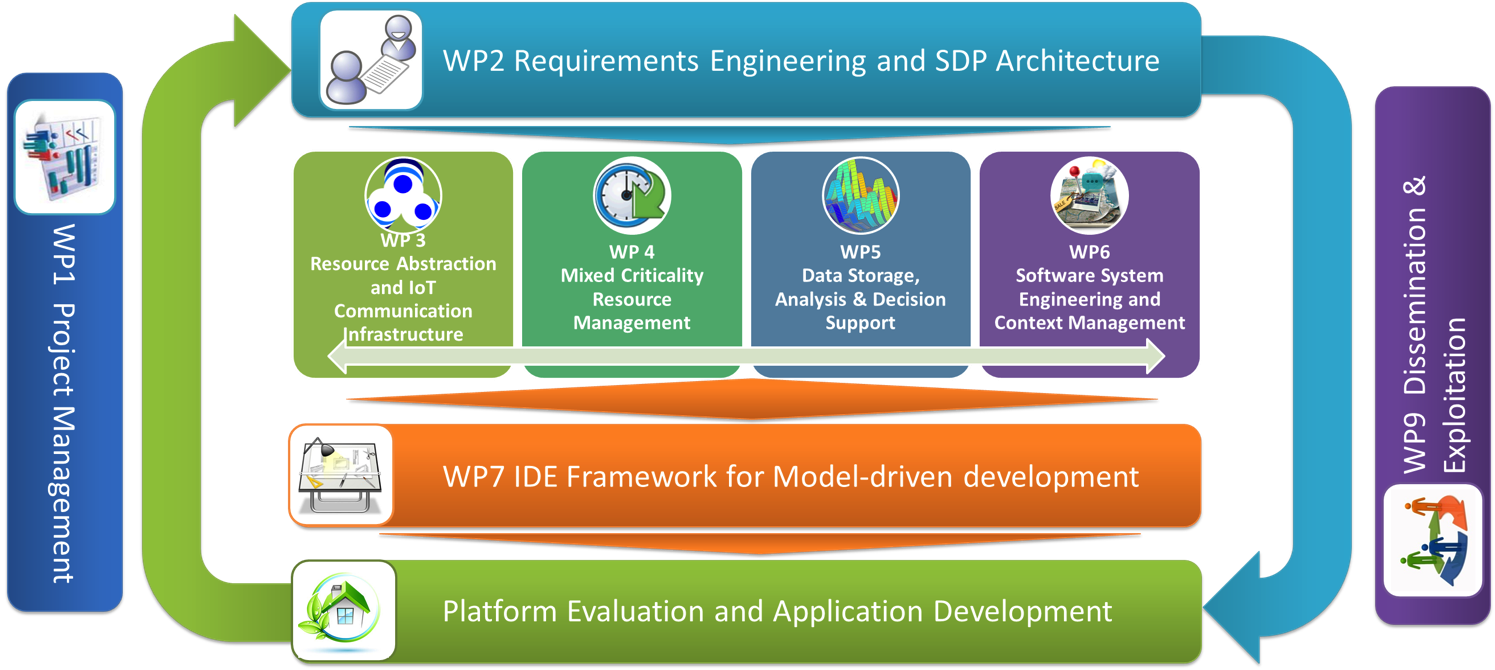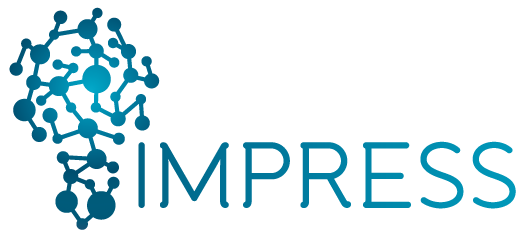IMPReSS Work Plan
The IMPReSS project aims at solving the complexity of system development platform (SDP) by providing a holistic approach that includes an Integrated Development Environment (IDE), middleware components, and a deployment tool. The IMPReSS development platform consists of a set of technologies that help to build general-purpose applications accessing to a plethora of sources, such as information from the physical world, analyzing and fusing relevant data and perform monitoring and control operations on complex system. This is achieved through the definition of a number of tools and pre-defined modules that can be managed and combined in order to define a specific logic flow.
The project will deliver a total of 48 deliverables and prototypes over the 30 month period. A total of 40 deliverables/prototypes are public and will thus be available for download here on the project's website once they have been approved by the EC. A full list of deliverables can be found here.
Methodology
The IMPReSS project adopts an evolutionary requirement engineering, specification and design methodology, which complies with the following broad template for each iteration:
 • Requirements for development of sustainable applications • Requirements for development of sustainable applications
 • Developer requirements gathering and engineering • Developer requirements gathering and engineering
 • Architecture design specification and refinement • Architecture design specification and refinement
 • Enabling technologies research to implement the architecture • Enabling technologies research to implement the architecture
 • Prototype development of the platform, system integration and testing • Prototype development of the platform, system integration and testing
 • Evaluation of the development platform in the real application development • Evaluation of the development platform in the real application development
 • Lessons Learned and change analysis leading to requirements refinements. • Lessons Learned and change analysis leading to requirements refinements.
The methodology calls for requirements and stakeholder analysis based on initial requirements of the development platform derived from scenario thinking. These requirements would encompass the needs and priorities of all users as well as the wider marketability and exploitation of the resulting solution.
Incremental Development by Platform Prototyping
The project will prototype its major components including the IDE and middleware components and will evaluate the results for exploitation towards future rapid development platform. Furthermore the component prototypes will be used to test and verify the architecture, designed components and models of IMPReSS.
During the first 6-month, the prototypes will focus on proof-of-concept and mock up prototypes which are useful to facilitate the requirement engineering process. Thereafter, the prototype of the components will be evaluated by developing pilot applications. Following evaluation of the field trials, the results will be compiled together with Lessons Learned and update requests from external sources. All information will be used to update and refine the requirements specification, and, if required, an updated architecture design specification. In the final year of the project, the pilots will be extended and selected parts will be made public for demonstration activities.
Two research phases will be implemented in coordination with the incremental development methodology adopted above. At the end of each annual cycle a prototype will be developed with the specific purpose of illustrating the following aspects:
Prototype I (M14):
 • SDP Components: IDE for Model driven, communication management on an arm gateway, data analytics modules, context engine, mixed critical applications. • SDP Components: IDE for Model driven, communication management on an arm gateway, data analytics modules, context engine, mixed critical applications.
 • Evaluation pilot : Teatro Amazonas energy management system. • Evaluation pilot : Teatro Amazonas energy management system.
Prototype II (M26):
 • SDP Components : context modeling IDE, machine learning, network and event debugging, model Driven IDE. • SDP Components : context modeling IDE, machine learning, network and event debugging, model Driven IDE.
 • Evaluation pilot : University campus energy management system. • Evaluation pilot : University campus energy management system.
Further information about the pilots can be found here.
IMPReSS Work Packages
The project will be implemented with the activities being performed in nine dedicated work packages (WP) structured as depicted in the figure. Each work package has a designed WP Leader and clearly defined tasks, deliverables and milestones. work packages (WP) structured as depicted in the figure. Each work package has a designed WP Leader and clearly defined tasks, deliverables and milestones.
WP1 Project Management
The objective of WP1 is to ensure an efficient management of the project and a consistent high quality of the work to be performed and of the reports produced. Further, it deals with the administrative and financial management of the project.
WP2 Requirements Engineering and Architecture
The aim of this work package is to maintain a continuous discovery and analysis of user centric requirements, needs and prospects, to be used in the design, development, implementation and validation of the SDP and the pilot applications.
WP3 Resource Abstraction and IoT Communication Infrastructure
The objectives of WP3 are related to the implementation of a resource adaptation framework and a relevant development toolkit as well as the design and the implementation of a lightweight network communication and management infrastructure.
WP4 Mixed Criticality Resource Management
This work package aims at investigating platform wide resource management that control and schedule the access to the device, service and subsystems based on the criticality of the applications. WP4 will also investigate several techniques that can be used for classifying applications based on their criticality requirements.
WP5 Data Storage, Analysis & Decision Support
This work package is responsible for providing tools allowing developer to consistently manage massive amount of the acquired data from the smart objects, analyse and extract information and finally transform the information into knowledge that is useful for the application domain within integrated IMPReSS platform.
WP6 Software System Engineering and Context Management
This work package aims at developing a module of the IMPReSS IDE to manage context information of the users and systems. IMPReSS will provide a development tool to model the context information as well as situations involving users, and relevant information of the system that should trigger adaptation of the system.
WP7 IDE Framework for Model-driven development
The goal of this work package is to ensure that the IMPReSS platform is well integrated, easy to use, directly transferable to product development, and therefore increasing impact of the project in the commercial world. This work package will provide a common framework, guidelines, rules for managing the development of various development tools, and configuration components.
WP8 Platform Evaluation and Application Development
The objectives of WP8 are to evaluate the IMPReSS platform by applying it to real world system development. The systems used to evaluate the IMPReSS platform will be developed in the UFPE campus & Theater Amazonas. The systems will manage and optimize energy usage in both premises. WP8 will also obtain and analyze feedbacks from developers involved in developing the pilot systems in order to improve the platform.
WP9 Dissemination & Exploitation
The main objective of WP9 is thus to carry out a set of dissemination activities at the project level and to facilitate the successful exploitation of the results. The exploitation strategy will be set out in the Dissemination Plan. The overall objective of dissemination is to maximize the transfer of knowledge to the outside world, as well as within the project Consortium itself.
|




